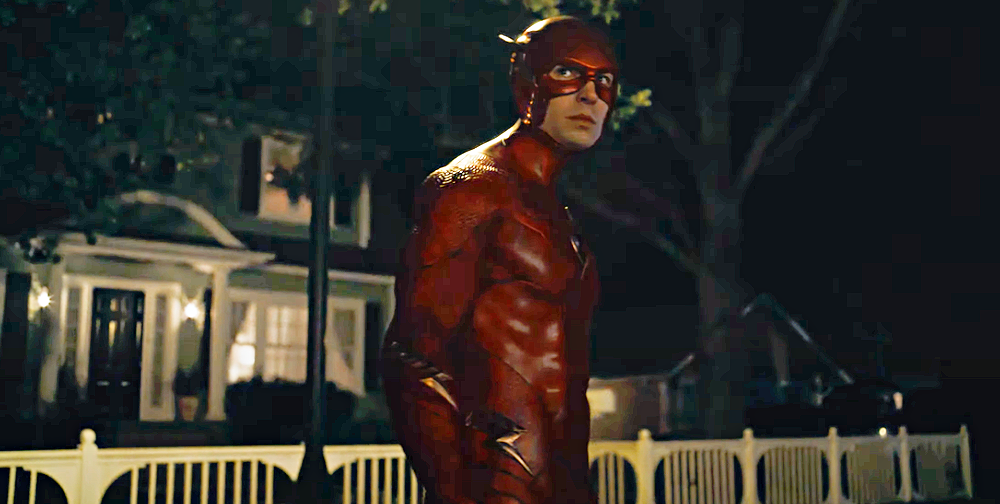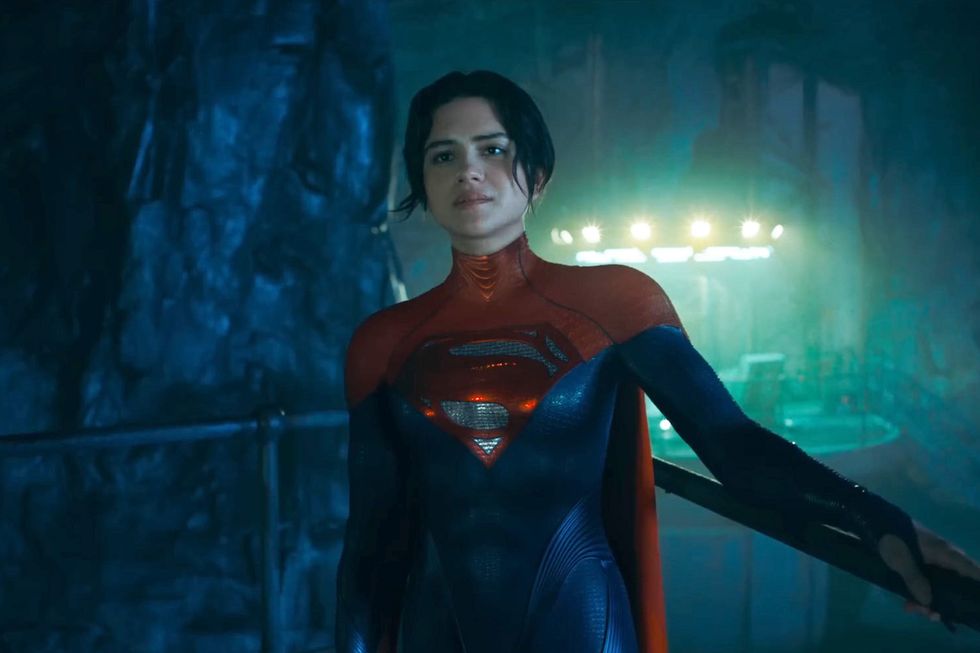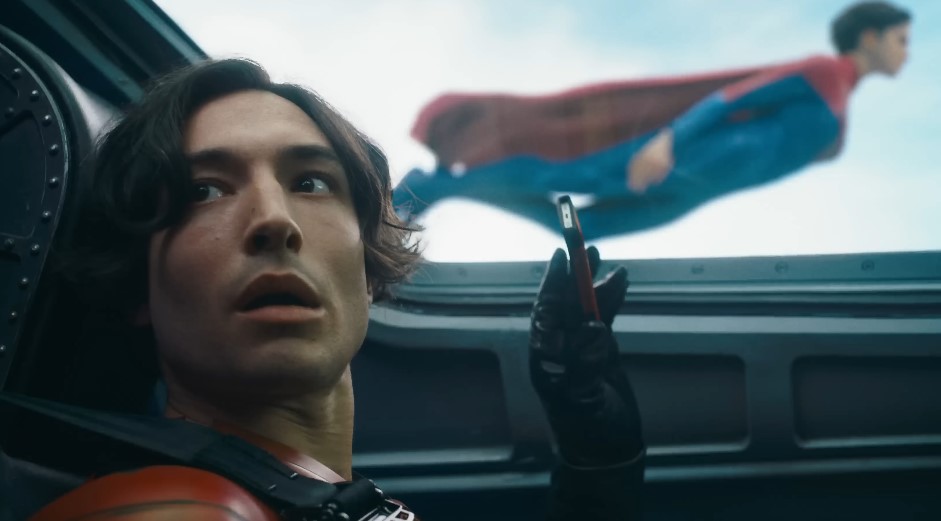The Flash should have been a slam dunk for Warner Bros. and DC. It’s packed to the gills with recognizable and beloved DC Universe personalities, and it revolves around one of DC’s flagship superheroes, who had yet to properly headline a solo feature film in any capacity, and had become plenty recognized in the public consciousness due to The CW’s unrelated primetime television series centered on the character. Finally, The Flash makes some legitimately interesting tweaks to the superhero movie formula, and asks a timeless question that most any audience member should be able to relate to; What if you could change the most traumatic event of your life?
All of the necessary pieces were present to make a surefire blockbuster hit, and yet, The Flash has since gone down as not only the biggest box office bomb in the history of the DC Extended Universe (bully for the comparably ill-fated, yet much cheaper Birds of Prey), but also one of the biggest box office bombs of all time, in general! No one cared about it, and almost no one outside of the established DC fandom went to see it. So, what went wrong? I mean, beyond the inexplicable decision by Warner Bros. to pit The Flash directly against Disney’s and Pixar’s high-profile animated family flick, Elemental.

The real tragedy is that The Flash, all things considered, is a competent DCEU movie that can be very entertaining, when taken on its own merits. Its attempts to innovate on the expected superhero movie formula are respectable, and this movie does represent some legitimate character growth for its eponymous lead. This is despite the continued uncertainty surrounding whether or not Ezra Miller’s Scarlet Speedster could even be a part of the rebooted ‘DCU’ canon, which this movie directly creates through its events. In fact, that might be the fatal issue right there; Despite its supposed world-changing stakes, as more or less the final chapter of the old DCEU, The Flash never feels like it truly matters. It’s not difficult to understand how this audience apathy was created when you really think about it either, considering that Warner Bros.’ DCU hype machine made a catastrophic mistake right from the jump; The marketing admitted from ‘go’ that The Flash’s events are irrelevant, because it’s all going to lead to a universal reset anyway.
The widespread knowledge that the entire DCEU was imminently about to be soft-rebooted into the new ‘DCU’, which will launch its own retroactive first chapter with this August’s DCEU holdover movie, Blue Beetle, already doomed the box office for this past March’s Shazam! Fury of the Gods, and The Flash was hit even harder. Rather than become the latest triumphant new frontier for multiverse-themed superhero movies, The Flash instead ultimately showed us everything that can commercially go wrong with them, leaving its helpings of DC fan service and legitimately heartfelt storytelling to flounder in the wake of a Warner Bros. corporate mandate that this movie just couldn’t outrun.
The Flash is an extraordinarily ambitious superhero movie that loosely adapts one of the most complex, pivotal comic book storylines in DC Comics’ history; Flashpoint. This storyline resulted from The Flash running back in time to change events surrounding his mother’s tragic murder. This small change to the past then creates widespread ripples that ultimately lead to an unrecognizable future, wherein humanity is at the mercy of an apocalyptic war between Wonder Woman and Aquaman, patriarch, Thomas Wayne has grown into an unhinged, murderous new Batman after Bruce Wayne is killed, and various other DC heroes and villains become unrecognizable due to tons of changes that added up over a revised history. It’s a fantastic story, one also loosely adapted within The CW’s The Flash television series at one point, though it is admittedly a bit of an ask to demand audiences invest in a massive superhero plot that probably should have capped off a pre-existing movie franchise, rather than launching it.
Despite The Flash charging immediately into the character’s abstract and complex time travel abilities however, it’s not like there’s no precedent for this bold creative decision. Ezra Miller’s Flash has been experimenting with time travel and dimension-hopping off-screen for a little while now, even making a cheeky cameo on The CW to briefly shake hands with his small screen counterpart. Right from 2016’s Batman v Superman: Dawn of Justice, in fact, The Flash’s time-manipulating powers were teased as playing a major part in a since-abandoned DCEU storyline surrounding arch-villain, Darkseid. Thus, it’s evident that the DCEU had already written itself into a corner here, possibly explaining why The Flash, which was originally scheduled to hit theatres in a vastly different form during March 2018, suffered so many years of development hell, along with incessant director changes and script rewrites.
“The Flash’s narrative stakes are ultimately undone by its titular character lacking a consistent story foundation in this universe.”
Perhaps if the DCEU had taken the time to frame proper origins for several of its key superheroes, it could have more organically developed this universe’s take on Barry Allen across several solo movies, right from his pre-Flash beginnings, something that this movie now has to scramble to address. The result is that Barry is both already too powerful for this first movie, and yet also frustratingly helpless to influence the plot, as the storytelling must contrive an excuse to force him into his own pre-determined origin story, where he quite literally spends most of this movie interacting with himself, specifically his 18-year-old self, from the day he received his powers. That also happens to be the day that General Zod invaded Earth during the events of 2013’s Man of Steel. How convenient for this movie’s mandated, CGI-laden final battle.
If this is already sounding like a bit of a narrative mess, well, admittedly, it really can be at times. Don’t get me wrong; The Flash still manages plenty of humourous and emotional moments, which help to distract from its messy storytelling and overburdened lead character arc. Even so, a persistent issue with this big screen take on The Flash is that he feels like he’s already at the end of his character arc, an arc we were supposed to see developed across at least a couple of The Flash solo movies that never ultimately materialized. I can definitely respect that The Flash is attempting something very unique for superhero filmmaking regardless, and it does thankfully manage to avoid a lot of the cliched hero/villain tropes that we’ve seen done to death since the 80’s in the process. Still, The Flash’s narrative stakes are ultimately undone by its titular character lacking a consistent story foundation in this universe, which means that audiences instead have to come for the innate charm and appeal of Ezra Miller in order to find something to invest in. That might be easier said than done.
With Ezra Miller’s Flash not serving as a reliable box office draw then, it’s small wonder that The Flash’s marketing instead leaned heavily on the return of legacy actor, Michael Keaton, reprising his role as Bruce Wayne/Batman for the first time since 1992’s Batman Returns. Thanks to some truly incredible time-bending retcons, Tim Burton’s duo of Batman movies now take place within the altered timeline born from Barry’s meddling in the past, wherein Barry’s mother is never killed by an unknown assailant during his childhood, a change that alters the future to the point where Ben Affleck’s familiar DCEU Batman is erased from existence, instead being replaced by Keaton’s OG cinematic Dark Knight.
Keaton’s return as Batman is legitimately exciting as well. No longer shackled by Tim Burton’s oppressive costumes and thoroughly bizarre action choreography (let’s face facts; Tim Burton’s Batman action scenes haven’t aged very well), Keaton’s heavily aged Caped Crusader is ironically at his action-packed best in The Flash, suddenly leaping about with almost supernatural agility, sporting a newly bulletproof cape, and still being able to dispatch his foes with an impressively lethal precision. Even more impressive is that the two Barry’s drag Keaton’s Batman out of a longstanding retirement, as he’s now the only superhero that exists in Barry’s revised ‘Flashpoint’ future, after Gotham City ironically becomes one of the safest places on Earth, essentially reducing Keaton’s Bruce Wayne to a half-deranged, unkempt hermit that’s spent decades just stewing in his demons within Wayne Manor.
The Flash’s heroic ensemble is further complemented by the introduction of Sasha Calle’s Kara Zor-El, a.k.a. Supergirl, cousin to the more well-known Superman. Henry Cavill’s Superman is ultimately absent from The Flash, outside of a brief CGI flyby cameo, and this is largely due to the fact that Barry’s revised future inadvertently leads to the infant Kal-El failing to land on Earth. Instead, Superman’s lost cousin, Kara, an older, more traumatized heroine who directly witnessed the destruction of her home planet, Krypton, becomes the displaced Kryptonian on Earth, only to be imprisoned since landing. With the threat of General Zod looming large, and no Superman present to save the planet in the new timeline, Kara thus has to become Barry’s ace-in-the-hole to keep history intact.

Surprisingly, as great as it is to see Keaton slip back into the Batman role like a well-fitting pair of gauntlets, it’s Sasha Calle that ends up being The Flash’s true DCEU breakout star. This makes it a crying shame that Calle’s future in the revised DCU is probably far from assured, despite a Supergirl movie having been officially confirmed to be in the DCU’s development pipeline. I, personally hope that Calle is allowed to stay on within the new DCU, because her Kara is an instant success; A harsh, yet noble Kryptonian survivor with no previous attachment to humanity, who is driven only by pain, but still wants to find her way back to the light. Even with fairly limited screentime, Calle’s Kara immediately grabs the viewer and captivates the imagination, quickly leaving The CW’s saccharine, ultra-wholesome live-action Supergirl in her dust with a much richer and more intriguing character. In fact, in a movie without a worthwhile Flash origin, it’s Kara that ironically delivers a more functional and heartfelt origin story, even with very little time to do so.
Ultimately however, this movie is still supposed to be Barry’s story. In that respect, The Flash contains many individual scenes that hit the proper emotional notes, from comedy to drama to pathos, and even to horror at times. Unfortunately though, they don’t add up to a fully satisfying whole, especially when persistently haunted by the ever-present knowledge that The Flash represents the last gasp of a dying cinematic universe, one desperately pleading with its audience to believe that things will get better under James Gunn’s and Peter Safran’s freshly-born DC Studios. Whether or not that ends up being true though, we still have to leg it through a supposedly pivotal Flash movie that immediately feels irrelevant, especially when we don’t currently know if Ezra Miller will even still be The Flash in the revised DCU. Hell, for all we know, The Flash may never truly exist at all within the new DCU!
Much ado has been made about The Flash’s production values, or potential lack thereof in some cases. The movie’s CGI has particularly come under fire, with some viewers deriding The Flash as a bloated, overpriced spectacle that nonetheless looks cheap and fake. It’s inevitable that The Flash would contain some weird imagery for sure, considering how much this character deals in time-bending weirdness. Even so, I do have to agree that The Flash’s visuals are uneven at best.
There are times where The Flash looks good, even great. An uninterrupted opening sequence of Barry running from Central City to Gotham City makes for a fun intro, for example. Likewise, some of the destructive flourishes and action scenes throughout the movie do still manage to be a treat for the eyes, particularly during the climactic battle against General Zod and his rogue Kryptonians.
Still, for every sharp-looking moment that’s worthy of the DCEU’s lofty production standard however, there’s another moment that really does look sloppy and overly cartoon-ish. Barry’s ‘Flash Time’ scenes are particularly dodgy in The Flash. One otherwise amusing opening bit has Barry rescuing an entire maternity ward from a high fall in slow-motion, for example, and it’s a moment that almost seems like it’s going out of its way to appear fake and unconvincing. Perhaps some of this cartoony presentation is intentional, especially when it does manage to fit somewhat with Ezra Miller’s wired, socially awkward take on Barry’s character. Regardless, these cartoon-ish moments play havoc with The Flash’s emotionally-charged themes of confronting the past, resolving trauma, and ultimately finding peace despite one’s helplessness. The Flash is simultaneously trying to be a powerful tale of letting go, and a crazed live-action cartoon about messing with the fabric of reality, and these two tonal halves just don’t gel as much as hoped.
“Surprisingly, as great as it is to see Keaton slip back into the Batman role like a pair of well-fitting gauntlets, it’s Sasha Calle that ends up being The Flash’s true DCEU breakout star.”
The most infamously problematic CGI moments in The Flash however often take place within the ‘Chronobowl’, a tangible representation of Barry’s trek through the DCEU timeline. The filmmakers have asserted that the Chronobowl is supposed to look eldritch and alien, and I suppose that argument can be valid, to a point. Even so though, there’s no excusing just how awful some of the DCEU’s familiar faces look here, with horrific CGI recreations of Henry Cavill’s Superman, Ben Affleck’s Batman and Gal Gadot’s Wonder Woman all spinning through a mess of historical events that are dizzying to the eyes. Not to be harsh as well, but I also imagine that this physically curled culmination of the DCEU’s timeline would have been much more appealing to look at if the DCEU had actually managed to string together a coherent, consistent narrative across its ten-year history.
This leaves Benjamin Wallfisch’s soundtrack to work extra hard at trying to string together a sense of emotional consistency throughout The Flash, often favouring cheeky whimsy over heart-wrenching anguish. True to the DCEU’s reputation, The Flash’s music selection is at least fantastic, and it helps to engage where the narrative sometimes unfurls. Even Wallfisch’s energized, yet delightfully weird score can’t fully salvage the moments where The Flash’s visuals and storytelling fail it though. It’s just another more universally superb element to The Flash that deserved to be attached to a better, more consistent movie.
(NOTE: The ‘spoiler’ section, when clicked, discusses whether The Flash has any post-credits scenes, whether it features any additional DC characters of note, and whether it sets up any future projects in the DCU.)
Outside of that one joke scene after the credits however, the status of any other legacy DCEU heroes or villains in the new DCU is currently unknown. The Flash’s proper runtime does end with some hilarious confirmation that Barry has changed the timeline again however, with Bruce Wayne calling Barry to meet up after Barry attends his father’s appeal hearing, only for Barry to see that Ben Affleck’s Bruce remains erased from existence, instead now seemingly being replaced by George Clooney’s Bruce Wayne! This is not only a funny, self-deprecating nod to the Batman movie franchise’s infamous low point, 1997’s Batman & Robin, but it also effectively gets the point across that Barry has returned to a very different present, even if James Gunn has since confirmed that this ending moment was simply meant to be a gag, and that Clooney won’t be the DCU’s new Batman, who has yet to be cast at this point.
The Flash does a lot right, but this production nonetheless feels like it was doomed from the start, in hindsight. It’s a tough movie to nail down a consistent opinion on, because director, Andy Muschietti does manage to craft a movie that can be a lot of fun when it hits its comedic stride, plus it does indeed manage to hit home with its bittersweet resolution, both in terms of Barry’s character growth, and in terms of the old DCEU’s ‘death’.

Despite Muschietti’s achievements in salvaging this hapless production however, The Flash is still ultimately a mess that’s tragically defeated by its own creative agenda. It’s a movie that succeeds at forging some inspired new ground for superhero movie storylines, but The Flash’s messy DCEU arc, most of which has taken place off-screen, is just the first thing working against the storytelling here. Considering how long The Flash languished in development hell, being lapped for years by its cousin TV series on The CW, things could have been worse for sure, but as audiences have already harshly proven, it’s also difficult to care about anything that The Flash brings to the table, when the entire movie is designed to reset its cinematic universe anyway.
So, as with Shazam! Fury of the Gods from this past March, we’re once again left to shrug at a holdover DCEU project that feels immediately irrelevant. At least the DCEU has finally mostly completed its awkward, undignified demise after The Flash though, hopefully indicating that Blue Beetle can return some actual stakes to this revised DC cinematic universe, at the very least.

